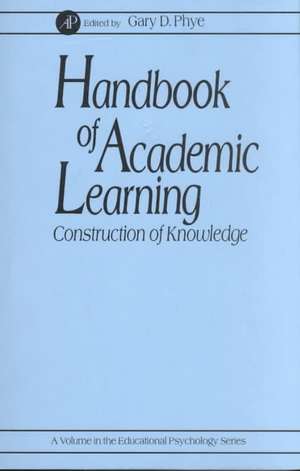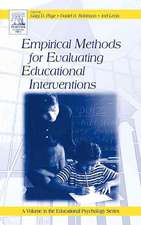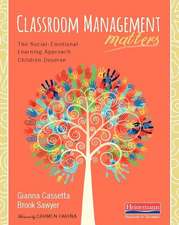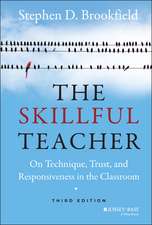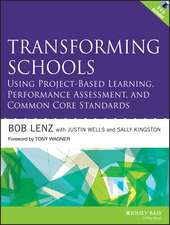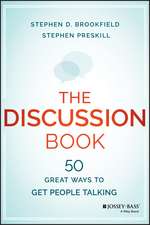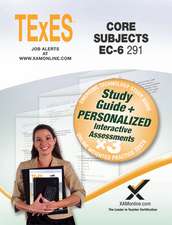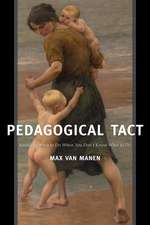Handbook of Academic Learning: Construction of Knowledge
Autor Gary D. Phyeen Limba Engleză Paperback – 2 feb 1997
The Handbook of Academic Learning provides a comprehensive resource for educational and cognitive psychologists, as well as educators themselves, on the mechanisms and processes of academic learning. Beginning with general themes that cross subject and age levels, the book discusses what motivates students to learn and how knowledge can be made personal for better learning and remembering. Individual chapters identify proven effective teaching methods for the specific domains of math, reading, writing, science, and critical problem solving; how students learn within those domains; and how learning can be accurately assessed for given domains and age levels.The Handbook takes a constructivist perspective to academic learning, emphasizing the construction of personal knowledge of an academic nature. Constructivism within the context of learning theory is viewed as involving an active learner that constructs an academic knowledge base through the development of cognitive strategies and metacognition. The book discusses the development of basic literacy skills that provide the foundation for higher order thinking and problem solving. Constructivism recognizes the social dimension of classroom learning and emphasizes the motivational elements of self-regulation and volition as essential learner characteristics.Written by authors who have experience with both theory development and the development of classroom instructional techniques, the Handbook empowers educators to develop, implement, and field-test instructional practices at their school site. The book provides a review of the literature, theory, research, and skill techniques for effective teaching and learning.
Key Features* Discusses teaching methods for specific subject areas: reading, writing, math, science, and critical thinking* Contains field-tested examples for the education professional at the school site* Reviews theory, research, techniques, and assessment at the school site* Identifies effective teaching with specific techniques* Covers elementary school through high school* Identifies how students learn to learn* Provides a resource for staff development
Preț: 676.45 lei
Preț vechi: 878.51 lei
-23% Nou
129.44€ • 138.41$ • 107.92£
Carte tipărită la comandă
Livrare economică 17 aprilie-01 mai
Specificații
ISBN-10: 0125542569
Pagini: 607
Dimensiuni: 152 x 229 x 27 mm
Greutate: 0.93 kg
Editura: ELSEVIER SCIENCE
Public țintă
Educational psychologists, cognitive psychologists, psychologists in test and measurement. Educators.Cuprins
Academic Learning: Perspectives, Theory, and Models:
E. Bredo, The Social Construction of Learning.
G.D. Phye, Learning and Remembering: The Basis for Personal Knowledge Construction.
M.H. Dembo and M.J. Eaton, School Learning and Motivation.
B.J. Zimmerman and R. Risemberg, Self-Regulatory Dimensions of Academic Learning and Motivation.
P.D. Nichols and D.J. Mittelholtz, Constructing the Concept of Aptitude: Implications for the Assessment of Analogical Reasoning.
Teaching "How to Learn" within Domains:
M. Pressley, R. Wharton-McDonald, J. Rankin, P.B. El-Dinary, R. Brown, P. Afflerbach, J. Mistretta, and L. Yokoi, Elementary Reading Instruction.
J.M. Royer, A Cognitive Perspective on the Assessment, Diagnosis, and Remediation of Reading Skills.
S.L. Benton, Psychological Foundations of Elementary Writing Instruction.
R.E. Burnett and L.M. Kastman, Teaching Composition: Current Theories and Practices.
M.L. Franke and D.A. Grouws, Developing Student Understanding in Elementary School Mathematics: A Cognitive Perspective.
S.R. Williams, Mathematics (Grades 7-12).
K. Tobin, The Teaching and Learning of Elementary Science.
J.J. Mintzes, J.H. Wandersee, and J.D. Novak, Meaningful Learning in Science: The Human Constructivist Perspective.
Learning to Learn:
G.D. Phye, Inductive Reasoning and Problem Solving: The Early Grades.
R.E. Mayer, Incorporating Problem Solving into Secondary School Curricula.
D.R. Olson, Critical Thinking: Learning to Talk About Talk and Text. Assessment of Classroom Learning:
W.D. Schafer, Classroom Assessment.
J.H.M. Hamers and A.J.J.M. Ruijssenaars, Assessing Classroom Learning Potential.
V. Spandel, Reflections on Portfolios. Epilogue: Classroom Learning, Looking Ahead.
Index.
